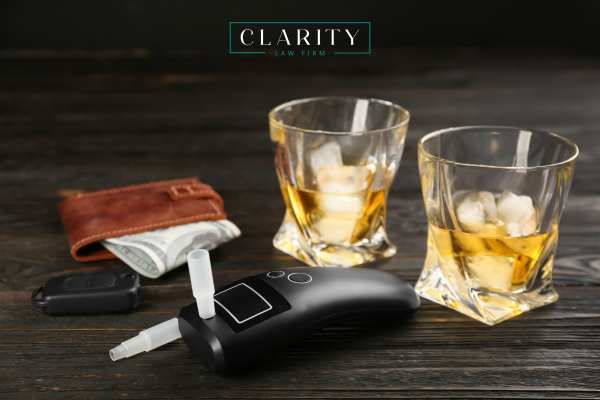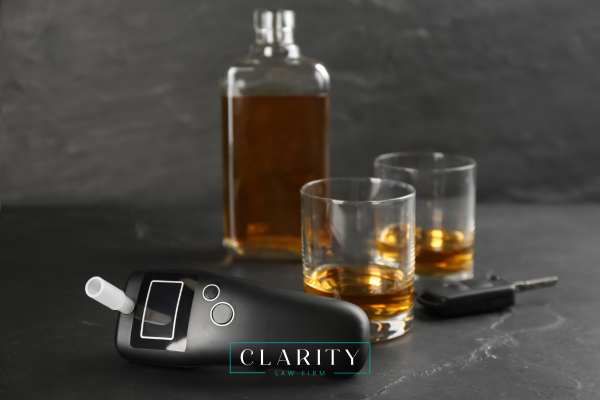In Michigan, drivers are subject to the state's Implied Consent Law, which mandates that by operating a vehicle, you've implicitly agreed to submit to chemical testing if suspected of driving under the influence (DUI). Refusing a breathalyzer test can lead to significant consequences. It's crucial to understand the distinction between the preliminary breath test (PBT) administered roadside and the official chemical test conducted post-arrest.
Declining a PBT is considered a civil infraction, carrying a fine of up to $150 plus court costs, but it doesn't result in points on your license or suspension. However, refusing the official chemical test after an arrest triggers automatic penalties under the Implied Consent Law, including a one-year driver's license suspension for a first offense. These penalties are separate from any DUI charges you may face. Given the complexities and potential repercussions, it's essential to consult with a knowledgeable DUI defense attorney in Dearborn to navigate the legal process effectively.
Call Clarity Law at (313) 513-1919 today to schedule a free consultation if you are facing a DUI charge.
BAC Laws in Michigan
Michigan has strict blood alcohol content (BAC) limits that determine whether a driver is legally impaired. The limits vary based on age, license type, and prior offenses. Michigan's BAC limits are as follows:
- 0.08% or higher – Illegal for drivers 21 and older (standard DUI threshold).
- 0.02% or higher – Illegal for drivers under 21 (Zero Tolerance Law).
- 0.04% or higher – Illegal for commercial drivers (CDL holders).
- 0.17% or higher – Triggers enhanced penalties, including higher fines, longer license suspension, and mandatory alcohol treatment.
Can You Be Charged With DUI Even if Your BAC is Below the Legal Limit?
Yes. Even with a blood alcohol concentration under 0.08%, you can face criminal penalties if law enforcement determines that you are impaired. Officers may rely on factors such as erratic driving, field sobriety test results, or the presence of other substances in your system. For instance, a blood sample might reveal the influence of drugs, leading to a drunk driving offense or a drugged driving charge. Prosecutors can argue that any level of impairment posed a danger to public safety, even if you were technically below the legal limit.

Understanding BAC laws is critical because violations can result in automatic license suspension, steep fines, and lasting consequences. Seeking legal assistance immediately is essential to protecting your rights and contesting the charges.
Michigan’s Implied Consent Law
Michigan’s Implied Consent Law requires drivers to submit to chemical testing if a police officer suspects them of driving under the influence (DUI). By operating a vehicle on Michigan roads, drivers automatically agree to take a breath, blood, or urine test when lawfully requested. Refusing to comply results in serious penalties, including consent suspension and additional points on your driving record. Even if you maintain a valid license before the refusal, the consequences will affect your ability to drive legally.
Penalties for Refusing a Chemical Test
Refusing a chemical test under Michigan’s Implied Consent Law leads to administrative penalties, separate from any DUI charges:
- First refusal – One-year driver’s license suspension and six points added to the driving record.
- Second refusal (within seven years) – Two-year driver’s license suspension and six additional points.
Related: What Should You Do After a DUI?
Unlike a DUI charge, drivers cannot obtain restricted driving privileges through a standard Secretary of State hearing after a refusal. Instead, they must request a court hearing to challenge the suspension. Drivers may also need to undergo evaluations or treatment programs if they wish to pursue license reinstatement.
Can You Be Charged With DUI If You Refuse a Breathalyzer?
Refusing a breathalyzer test under Michigan’s Implied Consent Law does not prevent law enforcement officers from arresting and charging you with DUI. Prosecutors can use other evidence to support a DUI charge, including:
- Officer observations (slurred speech, bloodshot eyes, odor of alcohol, unsteady movements)
- Field sobriety test results (if you took them)
- Dashcam or bodycam footage
- Witness statements
- Erratic driving behavior before the stop
Even without chemical test results, a blood sample taken later or other evidence can be used to support a conviction. Additionally, refusal may prompt police to seek a warrant for a blood draw to obtain evidence of intoxication. Refusing a test does not automatically result in a DUI conviction, but it complicates your defense and increases your legal risks. A skilled lawyer can help you navigate these challenges.
Challenging an Implied Consent Violation
While Michigan’s Implied Consent Law requires drivers to submit to chemical testing, a refusal may be legally challenged in certain situations. Certain exceptions and defenses can help drivers fight an implied consent violation and avoid harsh penalties.
Lack of Reasonable Grounds
Before requesting a substance use evaluation, an officer must have reasonable grounds to believe the driver was under the influence. If the officer lacked probable cause based on observations or failed to follow proper procedures, the driver may challenge the legality of the request. For example, if no evidence supports the decision to request a test, the consent suspension could be overturned.
Unlawfully Administered Test
Breathalyzer tests must be conducted according to strict protocols. If the test was not properly administered, the equipment was faulty or uncalibrated, or the officer failed to explain the consequences of refusal, the driver may have grounds to contest the implied consent violation. Similar standards apply to blood tests, which must also follow specific legal procedures to ensure accuracy.
Medical Conditions and Other Legitimate Defenses
Certain medical conditions or unique circumstances can prevent a driver from successfully completing a formal breath test, offering potential defenses against a consent refusal. Conditions such as asthma, lung disease, or neurological disorders can make it difficult to provide a sufficient breath alcohol sample. Additionally, confusion or miscommunication during the arrest can lead to misunderstandings, especially if the peace officer fails to properly explain your rights or the consequences of refusal.

Drivers may also argue that their actions did not amount to an intentional refusal. If a driver’s attempt to comply with a roadside breathalyzer test was impacted by physical limitations or a lack of clear instructions, these factors could serve as valid defenses during the legal process. A hearing provides an opportunity to challenge such issues before a hearing officer and potentially avoid the criminal charges associated with a refusal.
Engaging experienced criminal defense attorneys can make all the difference in building a strong defense against these allegations. They can present medical evidence, witness testimony, and procedural flaws to contest the implied consent violation and protect your driving privileges.
What Happens If You Refuse a Breathalyzer and Are Convicted of DUI?
Refusing a chemical test does not eliminate the possibility of a DUI conviction. Even without direct evidence of a blood alcohol level, prosecutors can rely on other evidence to pursue criminal charges. These may include the peace officer’s observations, field sobriety test results, and video footage of the driver’s behavior. Additional evidence, such as the presence of alcohol or other intoxicating substances, can further support the prosecution’s case.
If you are convicted of both DUI and test refusal, the penalties are compounded. These can include extended license suspensions, higher fines, and mandatory substance abuse programs. The added consequences highlight the importance of engaging criminal defense attorneys with extensive experience handling DUI cases. A skilled attorney can challenge the evidence, negotiate reduced penalties, and work to minimize the long-term impact on your life.
How Can You Get Your License Back After a Refusal?
Reinstating your license after a refusal involves navigating a complex legal process with multiple steps. Drivers who act quickly and understand their rights are better positioned to regain their driving privileges.
Requesting an Implied Consent Hearing
Drivers have 14 days from the date of refusal to request an administrative hearing with the Michigan Secretary of State. During the hearing, you can present a strong defense to challenge the validity of the report of refusal. Key arguments may include:
- The peace officer lacked probable cause to request the test.
- The roadside breath sample or testing equipment was improperly maintained or calibrated.
- Medical conditions prevented the driver from providing a sufficient urine sample or breath alcohol test.
Learn More: How Much Does a DUI Lawyer Cost in Michigan?
Success at this hearing may result in the dismissal of the suspension, allowing you to retain your driving privileges.
Applying for a Restricted License
If the suspension is upheld, you may petition the court for a restricted license to mitigate the impact of the automatic license suspension. This requires meeting strict criteria, such as proving that the suspension creates an undue hardship and demonstrating compliance with all court-ordered programs. Additional steps include:
- Installation of an ignition interlock device on your vehicle.
- Submission of documentation confirming the completion of any required substance abuse programs.
- A commitment to using the restricted license for essential activities, such as work or medical appointments.
Waiting Out the Suspension
If all options for early reinstatement fail, drivers must serve the suspension period in full. A first-time refusal typically results in a one-year suspension, while subsequent offenses lead to harsher penalties, including a two-year suspension. After completing the suspension, you may apply for a valid license by demonstrating compliance with all reinstatement requirements.

Working with a license reinstatement lawyer ensures that you fulfill all conditions and present a strong case for reinstatement. Their extensive experience in handling complex DUI cases can help streamline the process and improve your chances of success.
Protect Your License and Your Future—Get Legal Guidance Now
Facing the aftermath of a roadside breathalyzer refusal or a drunk driving offense can be daunting, but you don’t have to navigate the legal process alone. Whether you’re dealing with a consent suspension, seeking a restricted license, or fighting criminal charges, the right legal strategy can make all the difference in protecting your rights and driving privileges.
Our team of criminal defense attorneys has extensive experience defending against DUI and implied consent violations of chemical test rights. We understand the complexities of these cases and are dedicated to building a strong defense tailored to your situation. Contact our law firm today to schedule a consultation and take the first step toward resolving your case and restoring your future.
